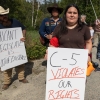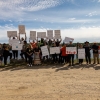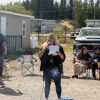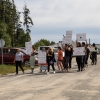Pope Francis spoke about asking for forgiveness in the name of the church during his six-day “penitential pilgrimage” to Canada. He also expressed his indignation and shame about the evil perpetrated in Catholic Church residential schools. Photos by George Nakogee.
Grand Chief Derek Fox stressed how First Nation leaders are calling for a financial investment after Pope Francis made his residential school apology during his six-day “penitential pilgrimage” to Canada.
“One of the things that was said to me was there should be a financial investment behind that apology, for example language,” Fox says on the first day of the Keewaywin Conference, held Aug. 9-11 in Timmins. “They helped take the language from us, why don’t they invest in the language, why don’t they throw a couple of million (dollars) at NAN (Nishnawbe Aski Nation) to help us with the language strategy, why don’t they invest in our school boards, put it into the curriculum to ensure that those things are not lost.”
Pope Francis spoke about asking for forgiveness in the name of the church during his July 24-29 “penitential pilgrimage” at an Aug. 3 General Audience at the Vatican.
“It was unlike other journeys, in fact the main motivation was to meet the Indigenous peoples to express to them my closeness and my sorrow, closeness of the church and my sorrow and to ask forgiveness for the harm done to them by those Christians, including many Catholics, who in the past collaborated in the forced assimilation and enfranchisement policies of the governments of the time,” the Pope says, as translated into English during the General Audience. “An in-depth study shows that on the one hand some men and women of the church were among the most decisive and courageous supporters of the dignity of the Indigenous peoples, coming to their defence and contributing to raising awareness of their languages, but on the other hand there was unfortunately no shortage of those who participated in programs that today we understand is unacceptable and contrary to the gospel, and for this I went to ask for forgiveness in the name of the church.”
The Pope had expressed his indignation and shame about the evil perpetrated in Catholic Church residential schools on the final day of his “penitential pilgrimage” to listen to, dialogue with and apologize to Indigenous people across the country.
“A short while ago I listened to several of you who were students of residential schools — I thank you for having had the courage to tell your stories and to share your great suffering that I could not imagine,” the Pope says, as translated into English during his July 29 visit to Iqaluit, Nunavut. “This only renewed in me the indignation and shame I have felt for months. Today too, in this place, I want to tell you how very sorry I am and to ask for forgiveness for the evil perpetrated by not a few Catholics who in these schools contributed to the policies of cultural assimilation and enfranchisement.”
The Pope stressed the testimony of an Elder who spoke about the beautiful spirit that reigned in Indigenous families before the advent of the residential school system.
“He compared those days when grandparents, parents and children were harmoniously together to springtime, when young birds chirp happily around their mother,” the Pope says. “But suddenly, he said, the singing stopped, families were broken up and the little ones were taken far away from home. Winter fell over everything.”
The Pope says stories such as the one shared by the Elder not only cause pain, they also create scandal.
“All the more so if we compare them with the word of God and its commandment, honour your father and your mother, that your days may be long in the land which the lord your God gives you,” the Pope says. “That possibility did not exist for many of your families, it vanished when children were separated from their parents and their own nation was perceived as dangerous and foreign.”
The Pope says those forced assimilations evoke a biblical story about the just man Naboth, who refused to give the vineyard he inherited from his ancestors to those in power, who were willing to use every means to snatch it from him.
“And we think too of the forceful words of Jesus about those who scandalize or despise even one of the little ones,” the Pope says. “How evil it is to break the bonds uniting parents and children, to damage our closest relationships, to harm and scandalize the little ones.”
The Pope encouraged the Inuit youth to continue listening to the Elders and to embrace their past in order to write new pages of history, and offered them three pieces of advice as an Elder brother.
“The first piece of advice is keep walking upwards — you live in these vast regions of the north, may they remind you of your vocation to strive ever higher without letting yourself get dragged down by those who would have you believe that it is better to think only of yourself and to use your time solely for your leisure and your interests,” the Pope says. “Don’t think that life’s great dreams are as unattainable as the sky above. No, you were made to fly, to embrace the courage of truth and the beauty of justice, to elevate your moral temper, to be compassionate, to serve others and to build relationships, to sow seeds of peace and loving care wherever you are, to ignite the enthusiasm of those all around you, to keep pressing forward and to not flatten everything out.”
The Pope’s second piece of advice was to come to the light.
“The third piece of advice, be part of a team,” the Pope says.
The Pope’s visit included a meeting with Indigenous people at the former Ermineskin residential school, in Maskwacis, Alberta and a meeting with Indigenous people and the parish community at the Sacred Heart Church of the First Peoples, in Edmonton on July 25; a Holy Mass at Commonwealth Stadium, in Edmonton and a Pilgrimage to the site of Lac Ste. Anne and Liturgy of the Word at Lac Ste. Anne, Alberta on July 26; a visit with state officials and public address at the Citadelle de Québec/Plains of Abraham, Quebec on July 27; and a Holy Mass at the National Shrine of Ste. Anne de Beaupré at Sainte-Anne-de-Beaupré, Quebec and a Vespers with bishops, priests, deacons, consecrated persons, seminarians and pastoral workers at the Cathedral-Basilica of Notre-Dame de Québec in Quebec City on July 28.




















I lost the love of my life Michael McGrath this past Sunday December 28, 2025. He was a bright light that shone for so many people in our families but also...
Christmas is just around the corner and everyone is getting into the spirit of the holidays with music, decorations, department store shopping and stocking...